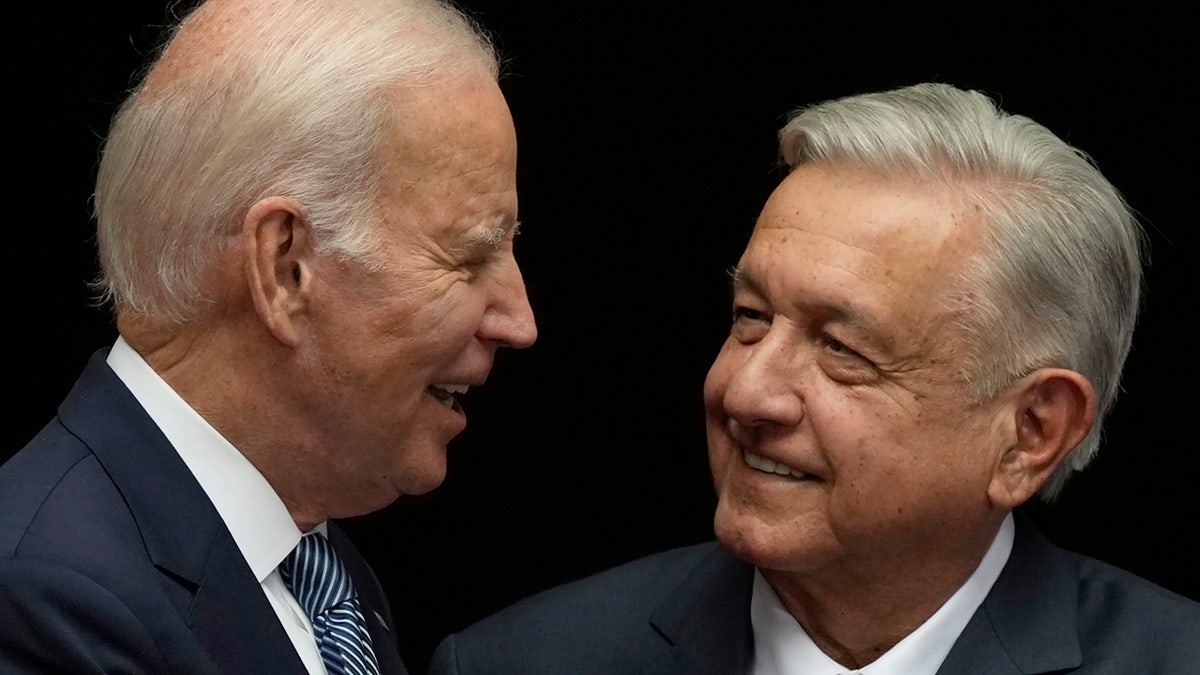DOJ to sue Texas over border buoys
National Border Patrol Council Vice President Chris Cabrera tells ‘Fox & Friends Weekend’ that most agents are ‘proud’ of Texas Gov. Greg Abbott’s border control efforts despite the legal action.
A federal district judge’s admonishment of attorneys for the state of Texas on Tuesday was portrayed in the media as a loss for Gov. Greg Abbott and his border-securing Operation Lone Star.
It wasn’t. If anything, it was the Department of Justice’s case that floundered.
DOJ sued Texas last month over the buoy barriers placed in the Rio Grande, contending the federal government should have been consulted, and further, that the buoys are "offensive" to the Mexican government.

Migrants crossing into the U.S. from Mexico walk along large buoys being used as a floating border barrier on the Rio Grande on Aug. 1, 2023, in Eagle Pass, Texas. (AP/Eric Gay)
And while the central premise of the federal government’s case was that it had regulatory authority over the Rio Grande as a navigable waterway, DOJ lawyers failed to prove it’s navigable (as was pointed out in the Texas Public Policy Foundation’s amicus brief on behalf of 22 members of Congress).
In a Tuesday hearing, U.S. District Judge David A. Ezra appeared uninterested in evidence that the Biden administration has abandoned the southern U.S. border and ceded control to the criminal cartels.
"This is a United States District Court. It is not Congress. It is not the president," Ezra said. "I’m not here to engage in nor do I have any inclination to engage in any type of political comment in this decision."
That’s not a loss; that’s a win for Texas’ case – because legally, Texas by itself has the power and the duty to defend its citizens when the federal government cannot or will not. Taking politics out of the equation is exactly what Texas needs.
The state bases its actions in Operation Lone Star, in part, on Article I, Section 10, Clause 3 of the U.S. Constitution – the compact clause – which provides, in part, that "No State shall, without the consent of Congress… engage in war, unless actually invaded, or in such imminent danger as will not admit of delay."
This turns on the definition of "actually invaded." And here, a little historical context shows that the border crisis in Texas clearly fits that definition.
BIDEN'S BORDER CRISIS HAS HURT EVERYTHING ELSE IN OUR WORLD AND NOW IT'S COME FOR THE KIDS
As my colleague Joshua Treviño notes, "The American history of the term ‘invasion’ reveals that its literal meaning is entry plus enmity: Entry alone, which is trespass, is not sufficient to constitute an invasion."
The phrase "actually invaded" was first used in the Articles of Confederation, and it was added to the phrase "by enemies." And those enemies included non-state actors, such as the Barbary pirates and Native American tribes. Invaders don’t have to be foreign governments, and they don’t have to be intent on conquest and occupation.
In Federalist 41, for example, James Madison cites worries about "daring and sudden invaders," who he calls "pirates and barbarians." Compare those Barbary raiders to the armed cartel members sighted by drones entering the U.S. in body armor and carrying weapons. That combination of enmity and entry is key.
Still, it seems like the Biden administration is living in a different reality. In its world, Mexico is a friend and a partner – whose cooperation on international issues is vital.
It’s not.
CLICK HERE FOR MORE FOX NEWS OPINION
In reality, Mexico’s president ended his week by laughing off the brutal, sadistic deaths of five college students at the hands of Mexican criminal cartels—knowing that the Biden administration would have his and his corrupt nation’s backs in a Texas courtroom a few days later. And indeed, President Andrés Manuel López Obrador was right.
On Tuesday, U.S.-Mexico border affairs coordinator Hillary Quam testified that Texas should remove buoy barriers in the Rio Grande because they have upset the Mexican government.

President Andres Manuel Lopez Obrador and President Biden shake hands at the National Palace in Mexico City, Jan. 9, 2023. (AP Photo/Fernando Llano, File)
"An issue like this distracts from the binational agenda," Quam said. "Our concern is that Mexico will not be a willing partner on other issues."
CLICK HERE TO GET THE FOX NEWS APP
The reality of the border demonstrates that Mexico is anything but a willing partner. Texans are paying the price for this willful blindness – often, with their lives.
Judge Ezra hasn’t handed down a ruling yet; written arguments are due in the coming days. But that won’t be the end of the story; we can expect this to reach the U.S. Supreme Court, giving the justices the opportunity to affirm the constitutional power of states to protect their citizens and sovereignty.














































